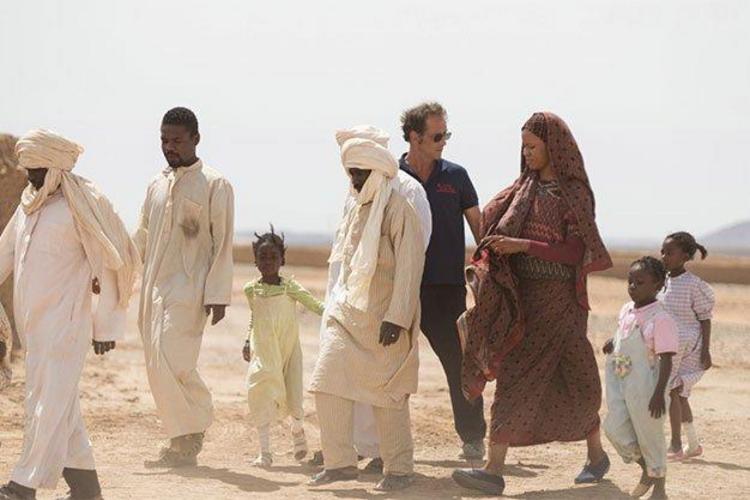Films > Film Reviews
The White Knights
Cinema City
25/11/16

Belgian director Joachim Lafosse's The White Knights is a complicated story simply told. The moral of this tale will ultimately be left to you, the viewer.
It is the tale of a fictional NGO - Move for Kids - perhaps a dozen or so people - operating in an unknown part of Africa. These White Knights are a group of active, concerned French citizens with non-specific qualifications, accompanied by a team of trained medical professionals, seemingly motivated by one cause - the safety and sanctity of orphaned African children. They have proposed to villagers in the region that these orphans be treated and educated over the course of 13 years in a camp somewhere beyond the horizon. They consult with local chiefs, who are paid for their help and so an agreement is reached. However, their full intention only becomes apparent when the team begin communicating with hopeful couples seeking to adopt in France. The supposed humanitarian mission turns into a people smuggling operation.
A whole set of double-standards and contradictions feature in the film, as a perceived 'just cause' drives the leader, while impulse and absolutism become its undermining. The whole operation skirts round the formalities of government and legalities, yet the team remain dogmatic about their own mission. The team are prepared to reject procedure in order to carry out their mission and, while passion and idealism play out on the group dynamics, the leaders insist the Africans stick to their conditions. The group's leader becomes aggressive whenever he suspects the village chief of deceiving him, yet his claim that the organisation will remain in the region, to educate and treat these poor, orphaned infants, is a masquerade. Watching these contradictions emerge, there is a sense of impending tragedy. As one becomes acquainted with the failings of humanity, one starts to recognise where acts of humanity fail. All that remains is a process underpinned by the almighty dollar.
The camera direction is free from gimmicks or any obvious technique - it is, like the journalist in the team, merely present to record the action. But it is recorded well, and the changing situation opens up a range of questions - the environment is hostile in many ways, and some parents plead with the organisation to take their children. There are people on all sides who casually exploit the situation, to varying degrees, and the whole thing can almost be read as one chain of sales. Agreements are reached and money changes hands.
Lafosse is no stranger to the ambiguities entailed in looking after vulnerable children. His previous film, Our Children was inspired by a real situation in France, where a mother ended up killing her five children. As in The White Knights, everyone seems to be motivated by the welfare of the children. While Our Children's conclusion was inevitably tragic, White Knights ends in a very ambiguous way. From the children's extended relatives to the country's institutions, all were deceived. What true principle is based on such a lie?
Like Our Children, White Knights was also inspired by a true story, The Zoe's Ark Controversy, where an NGO set out to rescue 'orphans' from war-torn Darfur, but when the organisation's members were arrested by authorities in Chad, it was clear the children were from Chad, and had parents. That resulted in trials and sentences of hard labour in Chad, which was then changed to jail-time in France. After serving five months, Nicolas Sarkozy negotiated with the President of Chad and the charges were dropped. The final result was millions of dollars worth of restitution payments.
There have been many such mass-adoption incidents in history, with the stated aim of humanitarian concern, but which are, by definition, human trafficking - a U.S. church group in Haiti, the U.S. Operation Babylift during the fall of Saigon, the Pedro Pans of Cuba. Likewise, there is a black market for this nature of 'business', such as in illegal adoption of Romanian orphans with the fall of Ceaucescu or Indonesian orphans in the wake of the tsunami. The KONY 2012 campaign was a privatised humanitarian project. TOMS recently 'donated' millions of their shoes - to the impoverished people who made them.
In this time, we see the biggest refugee crisis since World War II, a product of invasions conducted in the name of 'humanitarian concern'. We are reminded about the black market industry of human trafficking. Fleeing civilians are portrayed as liabilities washing up on the shore - illegal or economic migrants out to take our women and jobs. North African and Middle Eastern couriers and boatmen are 'gangs' who have profited from the plight of others. In tandem, we see organisations whose mission is the transportation of people into Europe, bypassing all legalities or formal procedures. They, too, are financed for their endeavours. Multi-billionaire George Soros has recently announced that he will invest $500 million into 'startups, established companies, social impact initiatives, and businesses started by migrants and refugees' with a primary aim to 'create products and services that truly benefit migrants and host communities'. But if governments have not officially processed these undocumented migrants, then they will essentially be illegal workers in a stateless limbo, dependent on their employer for protection. Who could not recognise the scope for exploitation? Humanitarian Aid. Criminal activity. In a conflicting world, one can be an expression of the other.